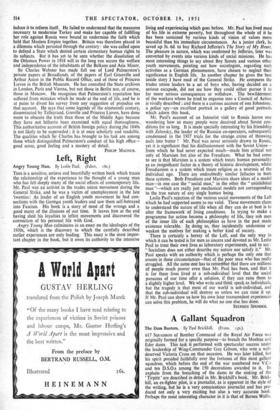Left, Right
Angry Young Man. By Leslie Paul. (Faber. i 8s.) THIS is a sensitive, serious and beautifully written book which traces the relationship of the experience to the thought of a young man who has felt deeply many of the social effects of contemporary life. Mr. Paul was an activist in the trades union movement during the General Strike, and, he was a victim of unemployment in the late 'twenties: As leader of an English youth movement he had con- nections with the German youth leaders and saw them self-betrayed into Fascism. His book is a story of most of the wrongs and a good many of the illusions of our time. It leaves him at the end having shed his loyalties to leftist movements and discovered the connection of his personal life with God. Angry Young Man culminates in an essay on the ideologies of the 1930s, which is the diScovery to which the carefully described earlier experiences are only leading. This essay is the most Impor- tant chapter in the book, but it owes its authority to the intensive living and experiencing which goes before. Mr. Paul has lived most of his life in extreme poverty, but throughout the whole of it he has been sustained by various kinds of vision of values more beautiful than his immediate circumstances. As a junior clerk, he saved up 3s. 6d. to buy Richard Jefferies's The Story of My Heart. The pleasure in nature, which was confirmed by Jefferies, later was converted by events into various kinds of social missions. He has most interesting things to say about Boy Scouts and various other youth movements, pointing out how sociologists, regarding such activities as a German phenomenon, have chosen to neglect their significance in English life. In another chapter he gives the best inside story I have read of the General Strike. He compares the trades union leaders to a set of boys who, having decided on a serious escapade, did not see how they could either pursue it to far more serious consequences or withdraw. The bewilderment of the workers whom he tried to organise into a Council of Action is vividly described ; and there is a curious account of one Johnstone, a police spy—an excellent portrait in a gallery of good portraits which adorn this book.
Mr. Paul's account of an Intourist visit to Russia leaves one wondering how so many people were deceived about Soviet con- ditions for so long. It is made specially interesting by his friendship with Zelensky, the leader of the Russian co-operators, subsequently condemned in the 1937 trials for the strange crime of throwing nails into butter ! Mr. Paul was never seriously drawn to Russia, yet it is significant that his disillusionment with the Soviet Union— from which he had never expected much—made him critical not only of Marxism but also of the Freudians. What he had come to see is that Marxism is a system which treats human personality as an insignificant factor in a theory of historic development, whilst Freudianism is a system which treats religion as a neurosis of the individual ego. There are undoubtedly similar fallacies in both these systems. Both Freudians and Marxists share ideas of a model man—in one case the " social man," in the other the " uninhibited man "—which are really just mechanical models not corresponding to the true nature of any single human being. Leslie Paul's rejection of the various social movements of the Left which he had supported seems to me valid. These movements claim to understand the nature of -life when all they can do at best is to alter the framework of living conditions. In trying to make a programme for action become a philosophy of life, they rob men of the inner life of such philosophies as have in the past made existence tolerable. In doing so, they incidentally undermine or weaken the motives for making a better kind of society. There is certainly a heresy of the Left, and the only way in which it can be tested is for men as sincere and devoted as Mr. Leslie Paul to treat their own lives as laboratory experiments, and to say: " Socialism does not either describe my nature nor satisfy it." Mr. Paul speaks with an authority which is perhaps the only one that counts in these circumstances—that of the poor man who has really struggled. All the same-one has to.remember that there are millions of people much poorer even than Mr. Paul has been, and that it is for these lives lived at -a sub-individual level that the social panaceas of our time offer a solution, if they can raise them to a slightly higher level. We who write and think speak-as individuals, but the tragedy is that most of our world is sub-individual, and that the sub-individual will destroy us unless we can, raise it up. If Mr. Paul can show us how his own later transcendent experiences can solve this problem, he will do what no one else, has done. STEPHEN SPENDER.


































 Previous page
Previous page